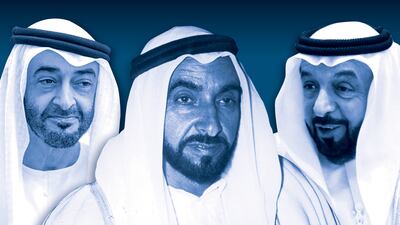Throughout the past week, the capital of the UAE, Abu Dhabi, was the stage for a momentous event signalling the third major transformation in the country’s modern political history.
Eminent world leaders converged in the UAE to share with its people in their mourning for the passing of a great and much-loved leader, Sheikh Khalifa Bin Zayed. Their assembly testified at the same time to the significance these leaders attach to Sheikh Mohamed Bin Zayed’s rapid ascension to the presidency, and the smooth transition of power in a leading Gulf nation at a time of enormous global geo-strategic instability.
The nation’s Founding Father, Sheikh Zayed Bin Sultan Al Nahyan, initiated the country’s first tectonic transformation in 1971. Against all local and regional odds, he established a modern state focused on the prosperity and wellbeing of its people, committed to goodwill to its neighbours, and engaged in global humanitarian service. The UAE’s vision and strategies were resonant with the pursuit of tolerance, empathy, and compassion – an ethos that became the country’s hallmark. His era established the UAE’s solid physical, institutional and moral foundations.
Following Sheikh Zayed’s death in 2004, his eldest son Sheikh Khalifa took up the reins of power in a smooth transition that heralded the UAE’s second transformation. His 18 years as Ruler of Abu Dhabi and President of the UAE brought about a dramatic evolution of the kind that few world leaders have overseen.
Under his leadership, and in close collaboration with the UAE government, led by Vice President, Prime Minister and Ruler of Dubai Sheikh Mohammed Bin Rashid Al Maktoum, the nation metamorphosed into an advanced regional and global heavyweight. He continued the Founder’s ethos through a focus on the welfare and security of the people, with substantial foreign aid donations, and by playing a responsible international role. Sheikh Khalifa’s era was one of empowerment, both of its citizens and its institutions.
This week, the Supreme Council elected Sheikh Mohamed bin Zayed to the Presidency of the UAE. This moment launches a new period of transformation that will be as momentous as the first two. His era will be marked by the nation’s steadfast progress towards the government’s far-reaching and ambitious centennial goals. His leadership will propel the country forward to become a global economic and knowledge-based powerhouse, and a world leader in governance, education, health and well-being.
Sheikh Mohamed has long been primed to assume the leadership of his country, brought up in the traditions of his father. Dedicated to his people’s welfare, he continued his father’s humanitarian legacy by helping the poor and needy and working with international agencies to eradicate preventable diseases and protect the world’s environment. His 18 years as Crown Prince of Abu Dhabi were spent helping his brother to shape the emirate into a modern and highly developed economy readied for the post-oil epoch.
As Deputy Supreme Commander of the UAE Armed Forces, he transformed the military into a powerful and high-tech deterrent, and one of the Middle East’s best equipped. This ensures the safety of a resource-rich yet midsized country that must navigate a vigilant path in a region riddled with conflict. And, serving as a de-facto leader throughout his brother’s long illness, Sheikh Mohamed has already played a major role in the day-to-day affairs of the nation. His leadership mettle has been tested by several crises from which he and the country emerged with resounding success.
He has invested the UAE’s oil wealth judiciously, developing the country’s status as a business centre of regional and global financial and economic importance. He has been able to extend the UAE’s international influence, assiduously cultivating strategic alliances with a broad spectrum of global leaders to strengthen the country’s wide network of partnerships in the region and further afield. His foreign policy was welded to the UAE’s ethos of bringing peace and stability, and to its ethic of tolerance and respect for human dignity.
Education and culture have always been central pillars of Sheikh Mohamed’s vision of progress. He believes that an advanced educational infrastructure and a vibrant cultural scene are essential to human happiness and economic sustainability. He has, therefore, worked to develop educational and cultural institutions of international standing, and to preserve the nation’s heritage, values and traditions while building bridges to world cultures.
Sheikh Mohamed Bin Zayed has unique qualifications as newly elected President. An inspiring and experienced leader, he will carry his nation forward towards its 2071 goals. The world community perceives him as a charismatic, wise, resolute and visionary leader. That he embodies the ethos of his father and the values of the nation is of great significance in today’s political climate.
Today, all nations experience the disruption of climate crisis, geopolitical uncertainty, an eroding international order and the imbalance between population growth and resources. Whole regions suffer conflict, violence, division and distrust. To achieve sustainable solutions in such a polarised world, we depend more than ever before on unified goals and the sharing of resources. We also need a sense of common humanity across the diversity and richness of global society.
Such a co-operative, humanitarian ethos is Sheikh Mohamed’s heritage and foresight. In bringing confidence and hope to his own people, Sheikh Mohamed Bin Zayed Al Nahyan bears a wider message of optimism to mankind.


